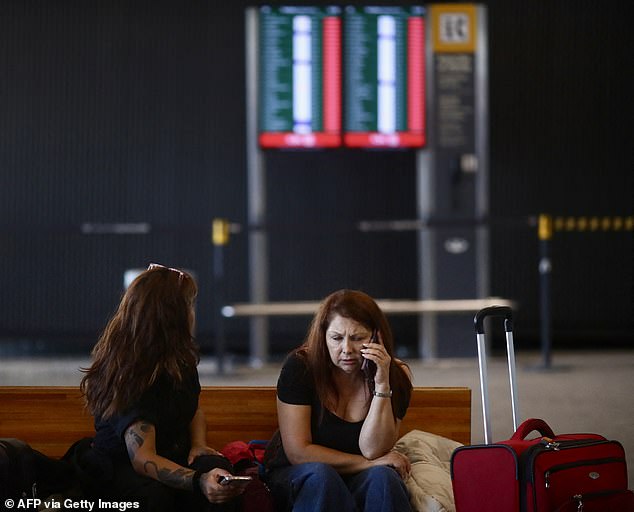Airlines have now been told they must give automatic refunds under a new Department of Transport rule that came into effect this week.
Flyers are now guaranteed their money back must be a flight delayed or cancelledand they don’t have to submit any paperwork.
Department of Transportation Secretary Pete Buttigieg said Wednesday the new regulation is an effort to encourage airlines to flight interruptionsdelays or cancellations.
‘When an airline knows that everyone – instead of just a few passengers on a canceled flight – is likely to get their money back, it gives them a different set of reasons to make the investment and the realistic scheduling that that making cancellations less likely to begin with,’ he said when the new regulation was announced.

Airlines have now been told automatic refunds must be issued for any ‘significant changes’ to a flight
With the new regulation also comes a strict definition for what constitutes a ‘significant change’, which previously varied from one airline to another.
Under the new law, a ‘significant change’ will be defined as any change to a flight that includes a delay of three hours or more for domestic flights, and at least a six hour delay on international flights.
An automatic refund will also be issued if a passenger is downgraded to a lower class of service or to an aircraft that is less accommodating for a passenger with disabilities.
Any changes to a flight’s departure or arrival airport or if a connection is added will also result in an automatic refund. As well as if a passenger has paid to choose a specific seat, but is forced to sit elsewhere.
If any checked baggage is not delivered to their gates within 12 hours of a domestic flight or within 15 to 30 hours of an international flight, airlines must now refund any checked baggage fees paid by passengers in terms of the new regulation.

With the new regulation also comes a strict definition for what is considered a ‘significant change’, which previously varied from one airline to another.

The new regulation also applies to any significant baggage claim delays, with refunds issued after 12 hours of a domestic flight and 15-30 hours of an international flight arriving at their gates
However, any baggage claim refunds will first require a passenger to file a mishandled baggage report with an airline.
This also applies to any flyers who use an airline’s Wi-Fi and have paid for it. If passengers pay for the service on board and it fails to work properly, they will be issued a refund of the cost of the service.
The DOT’s final rule makes it easy for passengers to receive a refund without navigating paperwork or sitting on the phone for hours.
On their website they said: ‘Also, passengers would (previously) receive a travel credit or voucher by default on some airlines instead of getting their money back, so they couldn’t sue for a refund or rebook with another airline when their flight was not. changed or canceled without navigating a cumbersome request process.’
Their new rule means refunds will be issued automatically and immediately, in cash or the original form of payment, and in the full amount of the ticket purchase price.
Before the holiday seasona list of airlines expected to experience the most delays was revealed in a new study this month.
The Office of Aviation Consumer Protection has its October 2024 Air Travel Consumer Report, designed to help customers navigate the quality of services provided by airlines.

A report from the Office of Aviation Consumer Protection revealed the airline with the worst projected on-time flight arrivals. It was concluded that JetBlue Airways has 60.75 percent of flights that can arrive on time

United Airlines, while still underperforming based on on-time flight percentages, took the No. 10 spot with 74.9 percent of flights other than arriving on time
In its report, the airline expected to experience the worst delays over the holiday was held by JetBlue Airways, with a grounded 60.75 percent of flights likely to arrive on time.
Second place was held by Frontier Airlines, with 65.2 percent of flights expected to arrive on time.
American Airlines ranked third with 66.7 percent and Spirit came in fourth with 67.1 percent of flights expected to be on time over the season.
The top performer in the report, while still underperforming based on on-time flight percentages issued by the government agency, was United Airlines.
United is expected to have 74.9 percent of its flights on time, with Republic Airways following closely at 74 percent and Alaska Airlines at 73.8 percent.
Endeavor Air, a subsidiary of Delta Airlines, is expected to have 73.5 percent of flights on time during the holiday season. Which is unfortunately four percent lower than the generality of on-time flights from the OACP’s report in August.
Allegiant Air followed closely at 73.2 percent, and PSA Airlines had a projected 72.5 percent chance of arriving on time — down from 80.6 percent of on-time arrivals earlier this year.





